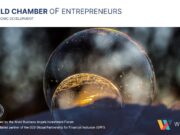Funding entrepreneur driven innovation is an imperative for economic
growth. Bringing the public and private sectors together to improve
early stage funding options is critical for the global economy.
Recep Bicer, Chair of the SME Development Organisation of Turkey makes it clear that SME’s play an important role in economic and social development. SME’s “inherent ability to adapt quickly to hanging conditions and their fl exible production structures” contribute signifi cantly to job creation and local development, he says. Aggregated at a national level, they make a large scale contribution to economic growth. Bicer urges that it is crucial that small businesses are able to remain dynamic in order to survive and be competitive in local and global markets. Yet, SME’s and start-ups face enormous challenges; among the toughest is their struggle to access fi nance and inability to accumulate capital. This lack of fi nancial resourcing impedes growth, business development, and ability to hire – in other words, SMEs that have the potential for exponential or fast growth instead grow far slower. A consequence of this challenge has been a shift of focus, where innovation becomes a vehicle to decrease production costs, respond quickly to evolving consumer needs, and ultimately preserve and sustain an SME’s competitiveness.
KOSGEB, the Turkish governmental organisation entrusted with the development of SME’s, has proven over recent years that partnering the private and public sectors yields powerful results in overcoming the abovementioned challenges. Collaboration, where both sectors combine fi nancial and intellectual resources, with a shared objective to obtain synergistic mutual benefi ts, is an elegant method of funding the innovation process and invigorating the entrepreneurial ecosystem. “It is well understood that the innovation capacity of a country does not depend on a single actor, rather it depends on more than one, and their success on equal terms; all acting in harmony and with systematic integrity”, says Bicer. This means that there is a need for another actor to conduct the orchestra. Bicer lends his voice to many others who see significant potential for private and public sector collaboration and remains resolute in his organisation’s objective to support SME’s through the funding of innovation. He is clear that being innovative should not be seen as extraordinary, rather it should be a state of mind; that innovation without commercial application and distribution is pointless; and that through better access to funding, great solutions should be scaling up.
High stakes for Business angels: Science Based High Risk-High Gain Projects
Business Angels face a dilemma when investing. On one end of the investment spectrum lie lower-risk, shorter-term investments with more clearly defined exit strategies. On the opposite end of the spectrum lie higher-risk, longer-term investments with less certain exit strategies. The potential returns are often far better for the latter, but many Business Angels learn the hard way that in the pursuit of bigger returns they may fail to find an exit. Gokce Tabak, COO of Istanbul Technical University Technopark and Acceleration Centre observes that when Business Angels fail to cash out, they can get cold feet to invest again. This serves neither Business Angels nor entrepreneurs well, meaning there is real value in considering any steps that can be taken to improve the success rate of high-risk high-return deals.
Gokce Tabak asked three distinguished individuals to share the improvement mechanisms they have seen or would like to see in this regard.
Tuba Terekli, Co-Founder and CEO of Qotuf in Saudi Arabia, highlighted the positive impact of enabling legislation. While she has seen improvement in many areas of the entrepreneurial ecosystem in Saudi Arabia over the past five years, she wants the legislative framework for companies not only to be based on established companies.
She is positive that there is better understanding of the early stage investment space, as more people now understand that start-ups are companies in the making. Entrepreneurial prospects can suffer when eager start-ups are unwilling to properly consider the needs of investors, or similarly, when investors are unwilling to offer support and experience in addition to funds. To adjust this requires shifting mind-sets and raising awareness of healthy entrepreneur-investor expectations.
 Yousef Hamidaddin, the CEO of Oasis500, a Jordanian based accelerator for the MENA region working extensively in the tech and creative space, suggests that reframing the way we think about risk is a vital first step to solving the problem at hand. He proposes that business actors take measured risks, which is “less about looking to mitigate risk and more about accepting and embracing risk instead”.
Yousef Hamidaddin, the CEO of Oasis500, a Jordanian based accelerator for the MENA region working extensively in the tech and creative space, suggests that reframing the way we think about risk is a vital first step to solving the problem at hand. He proposes that business actors take measured risks, which is “less about looking to mitigate risk and more about accepting and embracing risk instead”.
For Business Angels, it is important to ensure potential investments have been taken through a structured fault process; that the aspirations and plans of the entrepreneur closely match the ambitions of the investors; and that through this there is a healthy appreciation and acceptance that there are very real risks to the business. This approach means that both parties enter into the relationship with mutual understanding of the business goals and risks involved.
Axel Kalinowski, Manager for Continental Europe at the London Stock Exchange (LSE), approaches this dilemma from a very different angle as a representative of a traditional capital market. In the United Kingdom there are an increasing number of businesses and early stage investment funds able to make use of the LSEs Alternative Investment Market (AIM) to raise capital at a far earlier stage than would historically have occurred. While this may place pressure on Angels as a competitive source for capital, it does have a number of benefits as well. For starters, Start-ups benefit from access to London’s very sophisticated institutional investors coming in at a very early stage. These institutional investors have often developed through the commercialisation of academic research – as there is more desire to commercialise technological advances so there are more investment opportunities.
Organisations such as the IP Group, which works with 11 universities around the UK and is valued at over £1 billion, listed themselves on the public market to raise money that they can in turn invest into innovations in biotechnology, nanotechnology, clean energy, and other similar science based projects. Such organisations are gaining traction and becoming increasingly prevalent, making these an attractive alternative for start-ups in search of funding. Business Angels will need to be creative.
The way forward for Business Angels must surely be to take on more risk in markets that are better enabled through legislation, where entrepreneurs have a greater appreciation for the need to exit and where opportunities to sell out via traditional capital markets exist.



























